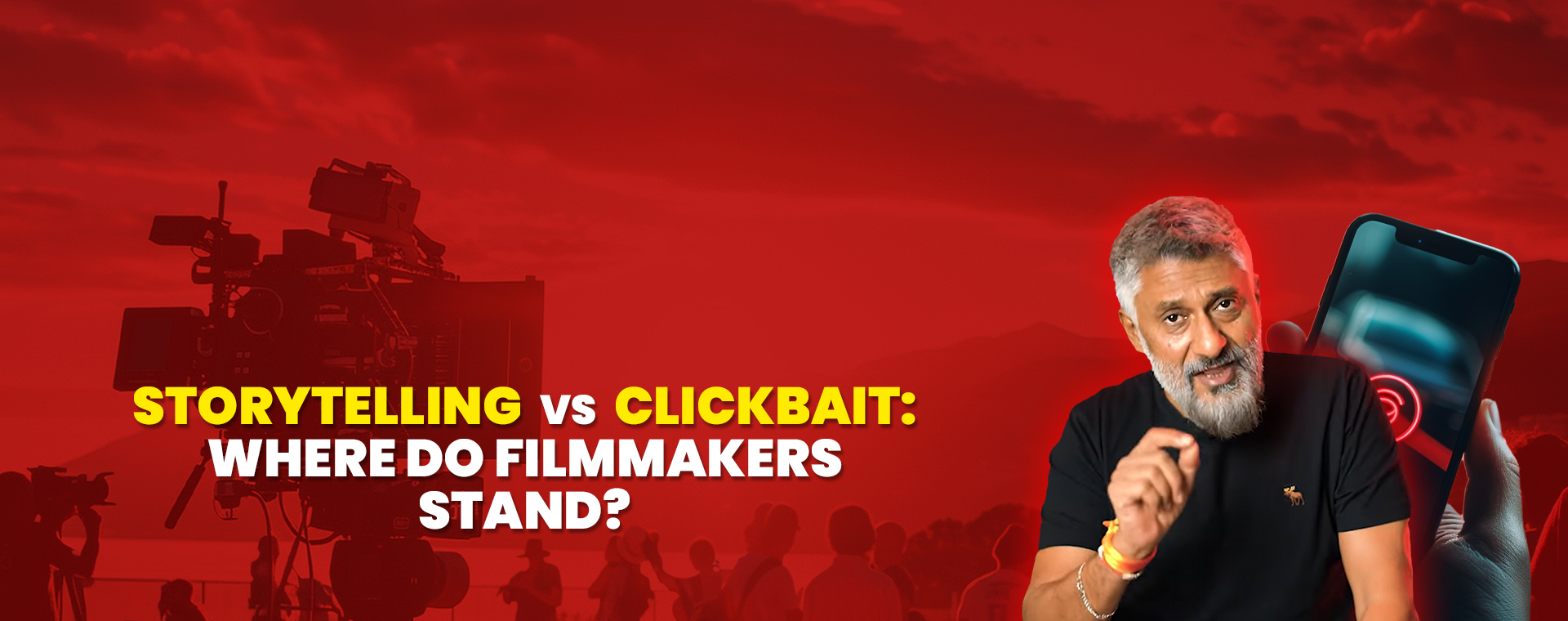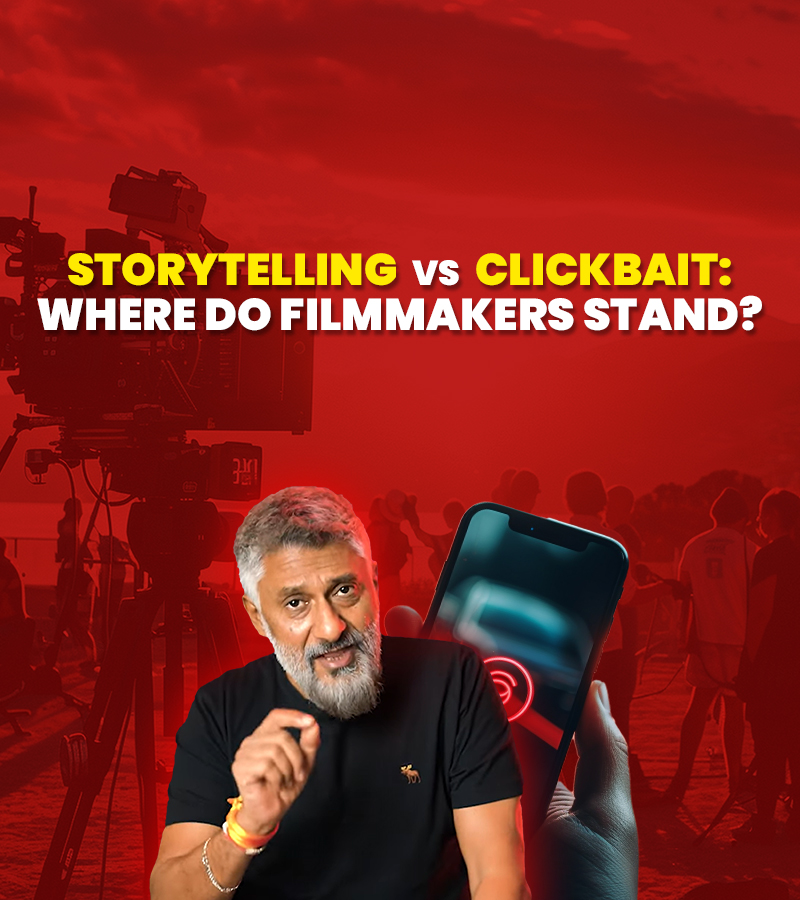

Ethical Storytelling in the Age of Sensationalism: Navigating Clickbait Culture
Can Indian filmmakers strike a balance creating engaging content without compromising the truth?
We live in a generation where headlines fight for attention and stories are crafted to go viral first. So, where does that leave the art of storytelling? Are storytellers staying true to what they’re telling and how they’re telling it?
Today, filmmakers and storytellers are performing a tricky balancing act of juggling commercial success with a sense of responsibility to convey their vision. But when sensationalism takes over and misinformation sits on the throne, where do ethical boundaries lie? In this article, we dissect the tension between creating meaningful content and staying true to one’s truth in the age of sensationalism.
Clickbait Culture: 10 Seconds to Catch Your Eye
In today’s digitally focused world where we’re consuming new information by the second, if something doesn’t grab our attention in less than seconds, it’s not worth our time. While wildly untrue, the fact remains that clickbait culture has made eye-popping titles more important than the information they’re conveying. If the content is not provoking the right reaction, making you want to click, share, and subscribe, does it even count as consequential?
For filmmakers, this dilemma is significant as sensational trailers bring masses to the theatres, but if the story isn’t attention-grabbing, the film may not work. This extends to documentaries as well as serious non-commercial content. Storytellers need as many eyeballs on their piece of work as possible, but sometimes exaggeration and dramatisation can compromise the truth. So, how does one make content engaging and commercially viable without resorting to cheap thrills?
The 24-Hour News Cycle: A Constant Need to be in the Know
If clickbait is the child of the digital era, then the 24-hour news cycle is its over-caffeinated sister. Equally fast and relentlessly demanding, the cycle of breaking news and fresh angles has blurred the lines between news and entertainment. Storytellers who love to capture real-world events face this pressure too, with constant updates and new insights always popping up.
Take the rise of docuseries, for example. Netflix has pumped the recent boom in this genre, thanks to the audience’s insatiable appetite for drama and suspense, with a dose of reality. However, filmmakers also know that if the story isn’t injected with juicy twists or shocking revelations, nothing will make the audience stay. But can, at some point, such drama jeopardise the truth?
While it’s tempting to sensationalise for the sake of engagement, filmmakers have the ethical responsibility to respect the gravity of real-life stories. Not every documentary or film can be touched up with a dose of drama and fiction, especially if it deals with a sensitive subject. The job of the filmmaker is to dramatically represent the story without distorting it.
Misinformation Overdose: How Far Can Storytelling Go?
Films are primarily stories, fictional or otherwise. They offer us the opportunity to escape our mundane lives and dive into a perceived reality that’s beyond our own. But in a world where the media doesn’t take a minute off, films are powerful influencers. If the colour of a swimsuit can shape opinions and fuel debates, some stories can certainly change the way people see certain issues. And if filmmakers decide to straddle the line between fact and fiction, they risk spreading misinformation.
There have been instances where films and documentaries have been heavily criticised for historical inaccuracies and fictional distortion. While the narrative may have been compelling, the audience doesn’t accept fiction as fact. And this is the crux of ethical storytelling. Filmmakers who hold the power of retelling historical or real-world events must ask themselves: How much can I fictionalise without crossing the line? Am I dramatising at the expense of truth? The answers to these questions are crucial for shaping the audience’s perceptions.
A Balancing Act: Entertainment with Integrity
As we mentioned in the beginning, many storytellers attempt this balancing act but how many succeed? And is it really possible to keep the audience engaged without a dash of distorted drama? Absolutely! As long as it’s done with integrity and a willingness to refuse the easier, more sensational route.
It all comes down to intention. Storytellers and filmmakers need to have a strong intent of telling their story. They must decide: Is my story’s goal to provoke thought, inspire change, or simply entertain? While there’s nothing wrong in creating a mass-loving entertainment ride, you can’t have the best of all worlds, you must choose a path.
Ethical storytelling isn’t just about dodging misinformation and distorted facts, it’s about recognising the power these stories hold in shaping the opinions of the masses. How do you plan on wielding that power?
The Road Ahead
As digital takes over, we know sensationalism is here to stay. In fact, it’s only growing in an era where scrolling without looking has become as competitive as an Olympic sport. But it also brings an opportunity for filmmakers to take a stand by staying true to their ethical responsibilities.
Audiences, too, bear the responsibility to consume content that truly resonates. Viewers of today are spoiled for choice, but they hold the power to only interact with content that’s authentic and meaningful. And filmmakers who can tap into this will not only tell better stories but will create a relationship with a loyal audience. So, the choice remains: Will filmmakers take the easy road, crafting stories that catch quick attention or will they rise to the challenge and commit to tell stories that are both engaging and truthful?
The future of storytelling depends on their choice.
Vivek Ranjan Agnihotri in conversation with the director of Munjya Aditya Sarpotdar, touches on this topic in VRA’s podcast. If you’d like to share your thoughts on this topic, join in here.






